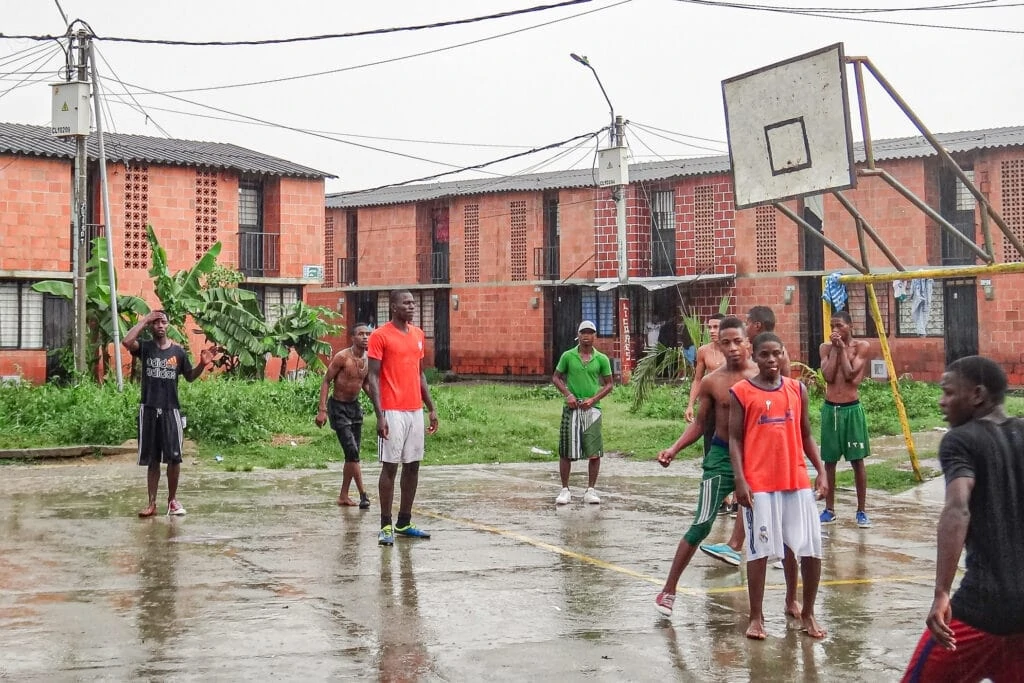Afro-Colombian youth from poorer neighbourhoods are particularly exposed to the gangs.
In the shadow of the Corona crisis, a wave of violence is sweeping across Colombia. The region of Valle del Cauca, where terre des hommes schweiz works with young people to prevent violence, is also severely affected. Armed groups are murderously reaffirming their territorial claims there and eliminating political opponents. Only last week, gangs presumably killed five innocent young people. In June, a group of soldiers raped a 12-year-old girl. We demand that justice be done for these crimes and that the criminals do not go unpunished.
It's Tuesday afternoon. Five Afro-Colombian youths meet on the outskirts of Cali. They want to eat some sugar cane in a field and maybe pick some mangos, they had told their parents. The 14 to 16 year olds also have a kite with them, which they fly. Hours later their bodies with bullet and cut wounds are recovered by rescue workers from a nearby gorge.
Recruitment or racist motives
The assumption is that organized armed groups are behind the crime. Not only in the department Valle del Cauca and its capital Cali guerrillas, paramilitaries and drug gangs fight bloody conflicts for territories and again and again drag innocent people into the fights. It is therefore possible that the young people did not want to be recruited into a gang and were therefore killed.
The poverty and lack of prospects make Afro-Colombian youth the target of the gangs, who recruit with empty promises. The prospect of belonging also makes the gangs attractive to black youth, as they are often stigmatized and socially excluded. This is why the murder of the five youths could also be racially motivated: death squads repeatedly attack black and indigenous Colombians.
The crime is not the only one: on the same day, a 15-year-old and a 16-year-old tied up, tortured and shotaccording to eyewitnesses of right-wing paramilitaries or renegade FARC fighters. And last Saturday in the southern department of Nariño, gunmen killed 12 indigenous youths at a village festival.
Valle del Cauca is strategically important
Activists for peace and the rights of black and indigenous people are also targeted by militias. They usually change their locations frequently to protect themselves. This is not possible during the lockdown. This makes it easier for militias to find, threaten or murder their political opponents. This year alone, gangs have killed 214 activists. The government remains silent.
The situation in the department of Valle del Cauca is particularly dramatic because of its mineral resources, coca plantations and drug trafficking routes. Human rights organisations publicly denounce the state's strategic policy of turning a blind eye to gang violence. The region has been heavily militarized by the government. But the vacuum left by the FARC after its disarmament cannot be filled by the soldiers. The violent crimes happen nevertheless.
Supporting civil society organisations
Worse still, the army is partly violent itself. In June, soldiers of the Colombian military raped a 12-year-old indigenous girl. In its statement, terre des hommes schweiz, together with other Swiss NGOs, called for the immediate prosecution of this crime, because the investigation of such acts of violence threatens to dry up quickly. The murder of the five young people and numerous activists must also be investigated by the judiciary. The criminals must not be allowed to go unpunished.
"In the current wave of violence it is important to support locally based, civil society organizations and peacebuilding actors," writes Andrea Zellhuber, our theme leader for violence prevention. "They also have a central role in disseminating important information about the pandemic. They enjoy great trust among the population and also reach people in remote areas".
Our partner organization Paz y Bien is committed to ensuring that no further generation grows up surrounded by violence. There, former gang members help violent young people to reconcile with their victims and to build up a new perspective on life through training and jobs. In this way the violence and the promises of the gangs lose their appeal. Now that Covid-19 is increasing the violence, this is especially important.
You can support here our work to prevent violence in Colombia.


